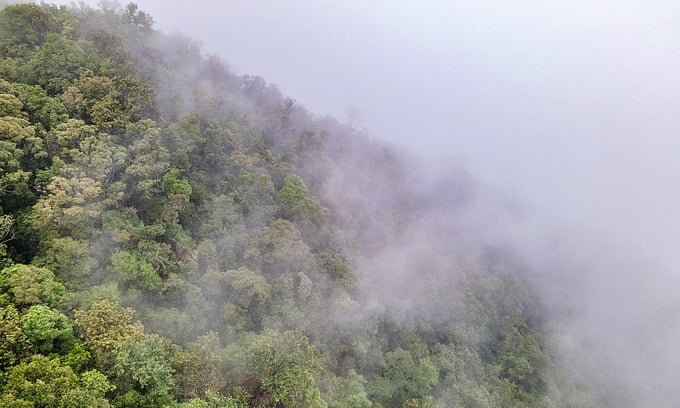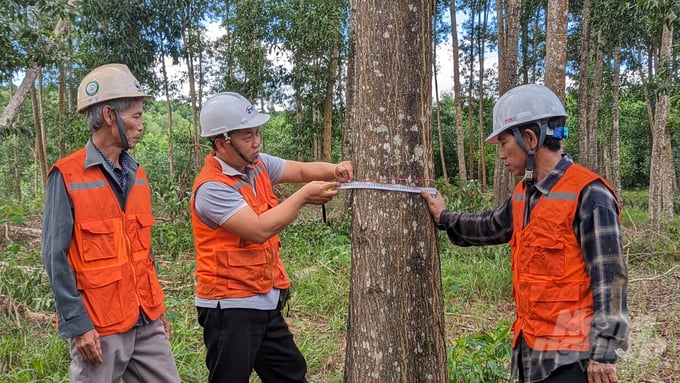October 24, 2025 | 05:53 GMT +7
October 24, 2025 | 05:53 GMT +7
Hotline: 0913.378.918
October 24, 2025 | 05:53 GMT +7
Hotline: 0913.378.918
Thua Thien-Hue province has 306,432.65 hectares of forest land, including 205,587.40 hectares of natural forest and 77,199.79 hectares of planted forest. The area eligible for calculating the forest cover rate is 282,787.19 hectares, resulting in a forest cover rate of 57.16%.
Following Government Decree No. 107/2022/ND-CP, Thua Thien-Hue is one of six Northern Central provinces involved in the pilot of the North Central Region Emission Reductions Payment Agreement (ERPA).

Thua Thien-Hue province has 306,432.65 hectares of forest land. Photo: Linh Pham/WB.
ERPA is a result-based emissions reduction payment initiative focused on carbon absorption and storage in forests, moving towards comprehensive implementation of forest environmental services. According to the plan, the Central Fund will allocate more than VND 131 billion to Thua Thien - Hue over three years (2023–2025).
In 2023, the total area of forest covered by ERPA in Thua Thien - Hue is 204,022.11 hectares out of 282,787.19 hectares, accounting for nearly 73% across seven districts and towns: A Luoi, Nam Dong, Phong Dien, Phu Loc, Huong Thuy, Phu Vang, and Huong Tra.
This coverage of over 205,500 hectares of natural forest has significantly improved forest management and protection, helping to maintain a forest cover rate of 57.16% across the province.
ERPA funds have enabled forest owners, particularly organizations, to enhance their forest protection workforce through contracts with forest-adjacent communities. Additionally, ERPA funds support forest development through activities like regeneration and enrichment, thereby improving the quality of natural forests.
The implementation of ERPA payments has raised public awareness about forest preservation, enhancing environmental conditions and encouraging concrete actions to protect ecosystems and natural resources. This policy has reinforced public trust in the Party and governmental forest protection and development policies, supporting social welfare for forestry workers.
Along with annual forest environmental service payments, ERPA funds provide motivation for forest protection forces, creating benefits and responsibility among beneficiaries and stakeholders. These funds also create a non-budget financial source for forest owners to manage and protect forests more effectively, while offering sustainable livelihoods for communities near forests, especially ethnic minorities, who make up nearly 70%.
ERPA funds have significantly increased forest protection frequency and quality, mainly supporting patrols and forest protection activities, such as labor compensation, patrol tools, and equipment. Many communities have expanded the cultivation of medicinal plants and non-timber forest products under the forest canopy, increasing forest-derived income.

Thua Thien-Hue is one of six Northern Central provinces involved in the pilot of the North Central Region Emission Reductions Payment Agreement (ERPA). Photo: Cong Dien.
The “community-centric” approach to ERPA-related activities involves forest owners coordinating with local governments to engage communities adjacent to natural forest areas, identifying forest areas to be protected, and planning livelihood development support.
A total of 105 communities are contracted to protect over 21,600 hectares of natural forest with an annual contract budget of over VND 13.7 billion, providing stable jobs and income for ethnic minorities and residents in remote areas.
Additionally, each community receives VND 50 million annually for livelihood development activities, such as clean water projects, lighting, roads, repairs to communal houses, sanitation facilities, and crop seed support. These initiatives contribute to improving local infrastructure and public facilities not yet funded or maintained by the government.
In the final months of 2024, Thua Thien - Hue's Forest Protection and Development Fund will continue implementing advance payments for beneficiaries under the 2024 financial plan from the approved North Central Region Emission Reductions Payment Agreement. This includes overseeing and guiding the ERPA payment process, forest management, and compliance with the forest management agreement across forest owners in the province.
ERPA payments will be completed through bank accounts, electronic Viettelpay, and public postal services to ensure the most convenient access for local beneficiaries.
Translated by Kieu Chi
/2025/10/23/5928-2-194850_964.jpg)
(VAN) The 'Regenerative cocoa production to support livelihood development in Vietnam' (ReCoPro) project marks an important step toward sustainable cocoa production.

(VAN) Reducing antibiotic dependence in livestock production helps protect public health, enhance food safety, and promote sustainable agricultural development.

(VAN) Experts describe Viet Nam as a 'policy laboratory' within ASEAN, where new agroecological, green finance, and risk-management initiatives are being piloted before wider regional adoption.

(VAN) Limiting rice straw burning and reusing agricultural by-products as materials or fertilizers not only improves soil health but also helps clean the air.

(VAN) ASSET delivers long-term vision and strategy, innovative models, learning networks, policy impact, and measurable environmental benefits.
/2025/10/21/1634-2-111000_41.jpg)
(VAN) A working delegation led by Vice Chairman of the Ho Chi Minh City People's Committee Bui Minh Thanh inspected fishing ports and assessed fishing vessel management work ahead of the EC inspection.

(VAN) Promoting digital transformation in irrigation is to enable early forecasting, modernize management of infrastructure, and enhance production efficiency at all levels.